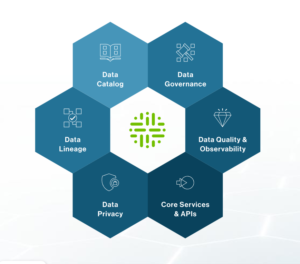
Data Intelligence Focus Rewarding for Collibra

(Billion Photos/Shutterstock)
What the world needs now, according to Collibra co-founder and CEO Felix Van de Maele, is a hefty dose of data intelligence. That is, it needs an intelligent approach to managing, governing, tracking, and securing data, if not the insight derived from data itself. Considering the company’s valuation essentially doubled last year to more than $5 billion, Van de Maele might just be onto something.
When Collibra was founded 12 years ago, it was one of the first companies–if not the first–to focus exclusively on data governance, which was not a popular topic at the time. “Collibra kind of created that data governance category,” Van de Maele says. “We’re well known in the industry for being the leader there.”
But over the past four to five years, the world has found that data governance was just not enough. It’s still important, mind you, but the demands placed on data have grown to the point where the collection of tools that businesses use to keep big data useful for the range of new use cases had to evolve. Driven by customer demands, this marked the beginning of Collibra’s transformation into becoming a data intelligence provider.
“We started to expand our platform. Data governance really didn’t fit the category any more,” Van de Maele tells Datanami. “We added data lineage capabilities, both with business trackability and very technical data lineage. We added data privacy capabilities. We said, ‘OK, we think of ourselves as data intelligence.’”
There are four main buckets in the data intelligence well, according to Van de Maele. They include:
- Governance and lineage–Ensures that data is tracked as it flows through an enterprise, and that it is trusted;
- Catalog and discovery–Delivers the ability to index data by category so it can be found by others;
- Quality and observability–Provide processes to address data errors;
- Privacy and security–Ensure sensitive data does not fall into the wrong hands.
Just as Collibra was at the leading edge with the data governance category, it’s also leading the way with data intelligence, Van de Maele says.
“We were the first ones coming out with data intelligence as a category name,” he says. “We’ve seen a lot of pickup of that name, of that category, by other vendors too, so that’s a good thing.”
The hottest subsector of data intelligence may be data quality and observability, Van de Maele says. “We’re almost seeing a renaissance in data quality,” he says. “Data observability is kind of the new name for it, which makes sense. As these data pipelines become mission-critical…you really need to be able to observe, or consciously measure the quality of the data that’s flowing through these pipelines, because they are fueling machine learning models that are mission-critical.”
In early 2021, Collibra made a move in data quality by acquiring a company called OwlDQ. Now a part of the company’s Data Intelligence Cloud offering, OwlDQ’s data quality tool uses machine learning to profile data, which enables it to extract the underlying rules governing data transformation processes and hidden data relationship.
The data quality and observability offerings complement other elements of the Collibra Data Intelligence Cloud offering, Van de Maele says.
“The way I think about it, data observability includes data quality,” he says. “If you really want to think of data observability, I think it needs to include lineage. I think it needs to include some data cataloging…And then also governance because you need to understand who is going to be impacted, and so the rolls and responsibility are important. It’s a great example of the strength of the Collibra platform or the Data intelligence Cloud, and why we believe all these things almost need to come together.”
There’s one more critical piece of technology underlying the Collibra offering: a graph layer. According to Van de Maele, the graph is a critical piece for using all of the capabilities in a unified manner.

Collibra Data Intelligence Cloud delivers a unified solution for data governance, lineage, discovery, catalging, quality, observability, privacy, and security.
“The way we think about it, what’s fueling the platform, is something called the metadata graph,” he says. “Of course, we don’t store any of the data. Data remains wherever it is–in the cloud, on prem, hybrid cloud. What we capture is all of the metadata… the technical description, the technical metadata, the business metadata, and we are connecting that. and that become like a graph, and on top of that we are providing governance, quality, lineage, privacy, and security capacities.
“But the fact that everything gets connected makes it really, really powerful and that allows us to automate many of these data workflows, which are critical to cope with the complexity that companies are faced with,” he continues.
Customers seem to be responsive to Collibra’s approach. At the beginning of 2021, the company had around 500 customers, and by December, that number had grown to about 600, the CEO says. Blue chips like Bank of America, Lockheed Martin, and Accenture shared their experiences with the Collibra solution in company events in 2021, and more are expected to this year.
“It’s definitely a ‘land-and-expand’ approach,” Van de Maele says of the company’s sales strategy. “We think of it more from a use case perspective than product perspective, [although] both are related. We also recommend that customer start with a particular use case, show value, show ROI. That’s how you build the platform.”
Perhaps the biggest use case at the moment is cloud data migration. Customers of all shapes and sizes are furiously moving on-prem databases to the public clouds. Collibra’s data intelligence offering is available in the marketplaces of all three major public cloud providers–AWS, Google Cloud, and Microsoft Azure–making it relatively easy for customers to get started.
At the end of the day, it’s all about the data. Customers are making investments to ensure their data estate is well-managed, well-governed and ready for downstream uses in advanced analytics and machine learning projects.
“The underlying pain point is always complexity and fragmentation,” Van de Maele says. “How do we make sure that all of our data investment–and every company is investing massively in data–is productive. How do we make sure we see ROI? And how do we make sure we stay in control?
“Everybody wants to move to the cloud, but nobody wants their name in the paper,” he continues. “So how do we make sure that we drive democratization, we provide broader access, we drive innovation – but all of that doesn’t become chaos and nobody can actually do anything, and that it doesn’t lead to a lack of control.”
In November, Collibra raised $250 million in a Series G round led by Sequoia Capital Global Equities and Sofina at a $5.25 billion valuation. That was up substantially from the $2.35 billion valuation Collibra enjoyed in April 2020, when it raised $112.5 million in a Series F round.
While some analysts have spoken of Collibra as an IPO candidate, it’s not in the cards in the near future, according to Van de Maele.
“An IPO in the future–probably, but there’s no timeline. That’s not the main focus right now,” he says. “We want to make sure that we have a strong balance sheet [and are] ready for the next phase for the next couple of years, which is really important to us. It’s important to our customers as well. We work with some of the largest companies in the world. These are long term, very strategic commitments that they have. They want to make sure that Collibra is going to be there five, 10 years from now.”
What will Collibra call its data management solutions then? Data intelligence may or may not be around, so we’ll have to wait to find out.
Related Items:
Collibra Announces $112.5 Million Funding Round, $2.3 Billion Valuation
Data Governance Startup Gains Funding
Avoid These Five Big Data Governance Mistakes































